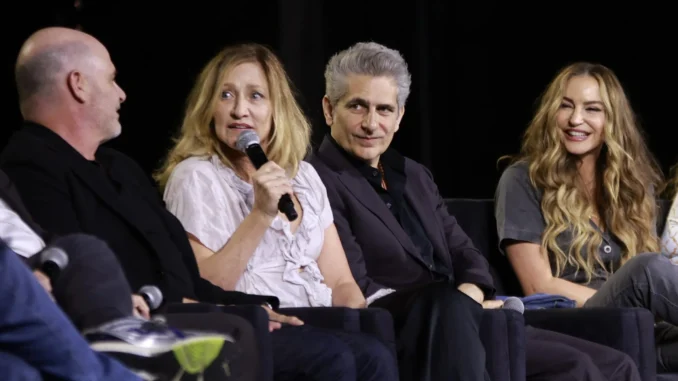
The Tribeca Festival recently became a nostalgic haven for fans of The Sopranos, as the cast and creators gathered to celebrate the series’ 25th anniversary. The event was marked by the premiere of Wise Guy: David Chase and The Sopranos, a captivating documentary directed by Alex Gibney that delves into the making of the groundbreaking series. Let’s take a closer look at this special reunion and the insights shared by the cast.
A Night to Remember at Beacon Theatre
The atmosphere at the Beacon Theatre on the Upper West Side of Manhattan was electric as fans and cast members alike gathered to reminisce about one of television’s most iconic shows. The documentary runs for nearly two hours and forty minutes and begins with the familiar opening credit sequence that drives into New Jersey, this time featuring creator David Chase sitting in the passenger seat.
As the lights dimmed, the audience was treated to an intimate look at the inspirations behind The Sopranos. Chase shared stories from his upbringing in an Italian American family, highlighting how his personal experiences, especially his relationship with his mother, influenced the show’s rich narrative.
David Chase Reflects on His Vision
Chase originally pitched The Sopranos as a feature film, but HBO was the only network that saw its potential. “This is the GOAT of TV series,” Gibney declared during the event, and it’s hard to argue with that sentiment. The show’s groundbreaking approach to storytelling, complex characters, and exploration of psychological themes have cemented its status in television history.
Reflecting on the reunion, Chase remarked, “I was so lucky to work with these guys, and I really saw today what a family this is.” His affectionate nod to the cast captures the camaraderie that has endured long after the series ended. The atmosphere was a mix of nostalgia and pride, as everyone recognized the monumental impact of their collective work.
Behind-the-Scenes Secrets Revealed
One of the documentary’s highlights is its behind-the-scenes footage, including audition tapes that offer a glimpse into the casting process. Gibney asked Chase about the moment he found James Gandolfini to play Tony Soprano. Surprisingly, it wasn’t a straightforward journey. “It didn’t really happen that way,” Chase explained. “Gandolfini didn’t want to do it, and he didn’t come to auditions. It was tough.”
Chase recounted an audition where rock star Steven Van Zandt, who eventually played Silvio Dante, walked in dressed in clothes inspired by mobster John Gotti. “I thought, ‘This is the guy,’ but then it didn’t work out that way.” This candid reflection showcases the unpredictable nature of casting and how some of the best outcomes are born from unexpected paths.
Edie Falco on Playing Carmela Soprano
Edie Falco, who portrayed Tony’s formidable wife, Carmela, also shared her thoughts during the panel. When asked about the hardest part of her role, she confidently replied, “I didn’t think it was hard. Very early on, Jim and I fell into this relationship that felt like we had already put in the 20 years previous that Tony and Carmela had.” This synergy between the actors allowed them to portray a deep and complicated marriage, making their interactions feel authentic and compelling.
Falco’s insights highlight the collaborative spirit of the cast, which was essential to the show’s success. The chemistry between characters added layers to the narrative, creating a rich tapestry that resonated with viewers.
The Influence of The Sopranos on Future Shows
Matthew Weiner, creator of Mad Men, also participated in the discussion, revealing how his time on The Sopranos shaped his career. “I joined [The Sopranos] in Season 5. It was the hugest thing in the entire universe, and [Chase] was so miserable that I literally was a cheerleader. I was like, ‘You know, everybody loves this,’” Weiner shared.
Weiner’s experience illustrates the pressure that comes with creating a hit show and how the collaborative environment fostered creativity and innovation. His transition from writing for The Sopranos to creating Mad Men demonstrates the lasting impact the series had on television writing and production.
Michael Imperioli’s Nostalgic Take
Michael Imperioli, who played the iconic character Christopher Moltisanti, arrived fashionably late but was met with cheers from the audience. His reflections were heartfelt: “The show was way better than I remembered. With some distance, how thorough a production it was on every level of the filmmaking … it’s just remarkable, how fantastic it is and how well it holds up over time.”
This sentiment resonates with many fans who have revisited the series over the years. The Sopranos not only holds up but continues to be relevant, sparking discussions about morality, identity, and the human experience.
The Enduring Legacy of The Sopranos
As The Sopranos celebrates its 25th anniversary, its legacy is undeniable. The series redefined television, paving the way for shows that embrace complexity, depth, and moral ambiguity. It opened the door for a new era of storytelling, where flawed characters could take center stage, allowing audiences to grapple with their imperfections.
The reunion at the Tribeca Festival serves as a reminder of the show’s cultural significance. It’s a testament to the hard work, passion, and creativity that went into making The Sopranos a landmark series. As cast members share their memories and reflections, fans are reminded of the emotional depth and artistry that made the show so impactful.
Conclusion: A Celebration of Creativity and Community
The reunion at the Tribeca Festival was more than just a nostalgic gathering; it was a celebration of the creative journey that The Sopranos embarked upon. David Chase’s vision, combined with the talent of the cast and crew, produced a series that continues to resonate with audiences worldwide.
As fans, we are fortunate to witness the stories and relationships that unfolded both on and off-screen. The documentary Wise Guy: David Chase and The Sopranos provides an intimate look at the heart and soul of the series, ensuring that its legacy will continue to thrive for generations to come.
